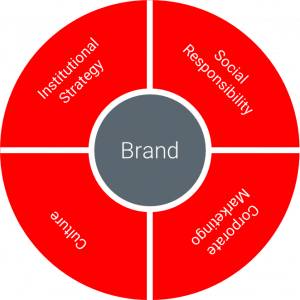It is possible for a company to have a transcendent purpose, which, like all claims, seeks results. It is about good business development by doing things right.
This means the brand, understood as the platform which reflects such a purpose, must be developed and evolve at the intersection between company strategy, social responsibility, culture and corporate marketing.
This is how the essence of the brand becomes richer and institutionally associated to the company in all its dimensions. This makes it truly unique and personal to its audiences –including society. It also makes it authentic. It is about going beyond the traditional positioning of a corporate brand.
The company’s challenge is therefore to be prepared to rise to the following level, where the brand has to present itself in a renewed and more relevant way, connecting to people more than ever before. It is having the determination to be greater, not in size but in developing a brand with a conscience and recognising that the:
- Brand is led by values: Brands have a conscience if their leaders have a conscience and their principles form part of the culture of the organisation.
- Brand interacts with interdependent audiences: Companies exist to satisfy the needs of shareholders, employees, clients and society in general –it is worth remembering that shareholder supremacy over other stakeholders is a recent phenomenon which emerged in the mid-1960s and that in recent years has lost ground due to its own resistance and short-term demands.
- Brand identity evolves with the involvement of people: Companies are leaning towards more participatory structures. Consumers, clients and other audiences are moving away from passive attitudes and so the lines between what is and what is not part of the system become blurred.
Our experience indicates that it is also a fact that brands have immediate specific needs, however, we know that they have greater requirements in the long term. It does not matter what stage of development a brand is in when this evolution and development from positioning to purposes starts.
You may also be interested in Reading “Brands with conscience, their focus on social”
Over the years, we have come to recognise that there are certain key aspects which produce more effective results in constructing purpose:
- Staying true to the essence:
- In a changing environment, what is permanent must be made clear.
- Craft-wise, like carving away material in a sculpture, the process must reveal the real situation underneath any observed symptom.
- Including key audiences in a co-creative process:
- The key is in managing expectations to avoid frustrations of this type of iterative dynamic –coming and going, constructing and destroying, creating and eliminating.
- Being agile and flexible:
- Provide results at each milestone, as they arise, without waiting until the end.
- Make the most of the inspiration of those participating, demonstrating correct management.
With a greater audience and as a good institutional observer, companies start to feel the need -and risks, of integrating culture and good work across the business, to thus create a positive change in the whole value chain and in its key audiences.
The importance of this latter point permeates brands that need to generate a knock-on effect in order to adapt the behaviour of their audiences and create a greater positive impact.
You may also like to read “The unbearable lightness of subtle disruptions”
Constructing an aim, or owning a brand with a conscience requires leaders who can take this transformation forward, meaning they can:
- Act in accordance to their convictions –intrapersonal
- Recognise the impact of their actions on others –interpersonal
- Possess the skill to understand the complex nature of organisations –organisational
- Be aware of the impact of company activities in society and the environment –societal
Against the brand leadership that many currently search for as an outcome, the community that establishes a conversation through these brands is actually more important.
Going from, “Leadership as the path, not the goal”
Great leaders create, increase and support a sense of community in and from the organisations, going beyond their individual leadership, to recognise the company’s collective nature.
Finally, in this changing world that is moving towards digitalisation, globalisation and politicisation of companies, brands with an purpose must convey:
- A sense of improvement: Offering the best in all that is done
- Passion: Doing business in a responsible and sustainable way is the norm
- Integrity: Constructing and fostering relationships with those who share the purpose
- Trust and honesty
You may also be interested in reading “Digitalise or be digitalised”
An organisation with a brand that means something special to others is an entity that collectively pursues a common goal.
At the end of the day, a brand needs ethics at its heart to maintain credibility.









0 Comments